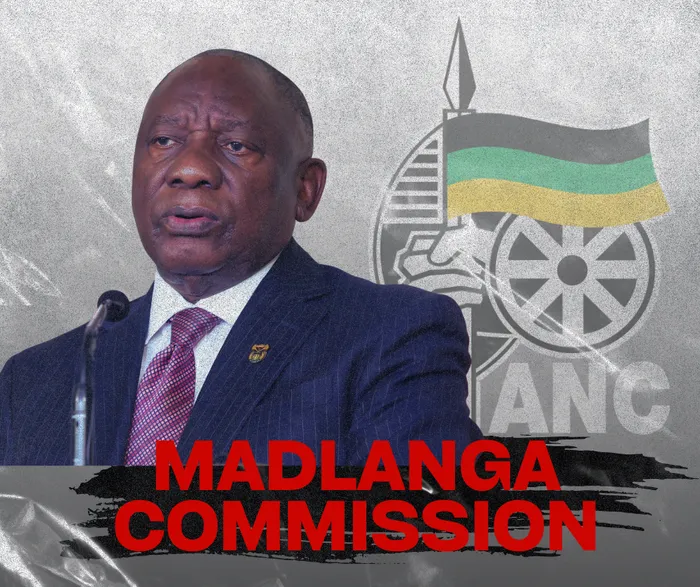
The Madlanga Commission opens this week in Pretoria, probing explosive claims of political interference and criminal infiltration in the justice system — with high stakes for President Cyril Ramaphosa and the ANC.
Image: IOL Graphics
This week South Africa will witness a Commission of Inquiry unlike any other, with its proceedings set to unfold at a Justice College that has been transformed into a courtroom.
This inquiry, informally named the Madlanga Commission after its chairperson, retired Constitutional Court Justice Mbuyiseli Madlanga, is poised to potentially expose some of the nation’s most deeply hidden secrets.
The commission, which has been allocated a budget of R147.9 million over six months, was established by President Cyril Ramaphosa to probe explosive allegations of a sophisticated criminal syndicate that has allegedly infiltrated law enforcement and intelligence structures.
These allegations were made public by KwaZulu-Natal Police Commissioner Lieutenant-General Nhlanhla Mkhwanazi, who is expected to be the first witness to testify for five consecutive days from 17 September.
The inquiry’s terms of reference also include political interference and corruption within the criminal justice system. The hearings will take place at the Bridget Mabandla Justice College in central Pretoria.
One of the key figures at the centre of the probe is the suspended Minister of Police, Senzo Mchunu. Mchunu was placed on special leave following allegations by Mkhwanazi that he had interfered with sensitive investigations.
Mkhwanazi accused the former minister of ordering the shutdown of the Political Killings Task Team, a directive he believes was meant to obstruct investigations into criminal networks with political connections.
The commission’s legal team is led by evidence leader Advocate Terry Motau and includes Advocates Matthew Chaskalson, Mahlape Sello, Adila Hassim, Lee Segeels-Ncube, Ofentse Mohlasedi and Thabang Pooe.
Other key members include Advocates Sesi Baloyi and Sandile Khumalo, who serve as commissioners alongside Madlanga. Dr Nolitha Vukuza is the commission’s secretary and forensic auditor Dr Peter Goss is the chief investigator.
According to commission spokesperson Jeremy Michaels, preparations have been made to ensure the hearings can commence on Wednesday, 17 September.
The commission is expected to produce an interim report within three months and a final report after six months, though legal experts have expressed doubt it will complete its work within this period.
Michaels said significant progress has been made in setting up the necessary infrastructure, and streaming services will be available for public access in partnership with GCIS and private broadcasters. However, some proceedings may not be entirely open to the public if classified information is being discussed.
The commission has garnered mixed reactions.
Stefanie Fick, Executive Director of the Accountability Division at OUTA, welcomed its focus on criminal infiltration and political interference.
She believes that for South Africa to recover from the devastating effects of corruption, the justice system must work for everyone. “Political interference is a big issue and a breeding ground for grand scale corruption,” Fick said.
However, she expressed concern that the commission’s findings are not legally binding and that the government might fail to implement the recommendations, as was the case with the Zondo Commission.
She added that to avoid “another toothless process,” civil society and the public must advocate for accountability, demand that implicated individuals are removed from leadership positions, and vote accordingly in the upcoming local government elections.
UKZN Political analyst Zakhele Ndlovu shared a similar sentiment of skepticism. He cited the pervasive nature of corruption and a “lack of political will to fight corruption,” noting that those “fingered in the Zondo Commission continue as if nothing happened.”
Ndlovu suspects that the ANC and its leaders, including some who have since defected to the MK Party, will be implicated.
“I don’t see this Commission changing anything,” he said, arguing that prosecutions and convictions would be the true measure of success.
Political analyst Goodenough Mashego was even more blunt, describing commissions of inquiry as “funeral processions for the truth.”
He stated, “A commission of enquiry is where the truth goes to die.”
Citing a history of commissions in South Africa that resulted in “silence” rather than solutions, Mashego said he fears the Madlanga Commission’s true purpose may be to “silence the voices that are questioning the authenticity of what General Mkhwanazi says.”
He also warned that closed-door proceedings and a “heavily redacted” final report could leave the public as much in the dark as they were with previous inquiries.
IOL Politics
Related Topics: